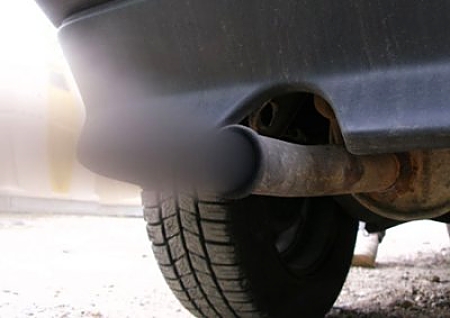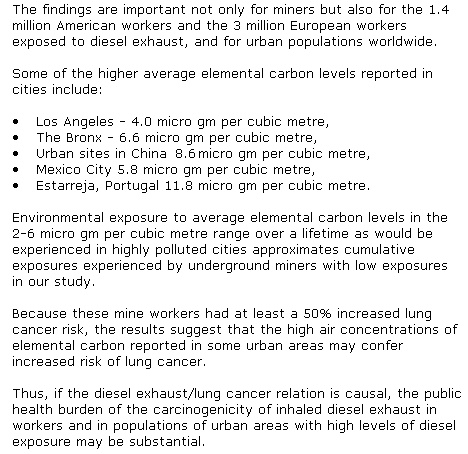Diesel Fumes Cancer Risks Similar to Secondhand Cigarette Smoke
The World Health Organization (WHO) has issued a warning that diesel fumes should be classified as a 'known carcinogen'. Experts have warned that diesel exhaust is potentially more carcinogenic and harmful than secondhand cigarette smoke.
WHO has warned that the risks apply to many American workers who are regularly exposed to diesel exhaust fumes especially in confined spaces.
This warning is especially relevant to developing countries, where diesel generators, trucks, buses tractors and a wide variety of factory machinery routinely discharge clouds of black smoke and pollute the air with sulphur particulates and other contaminants that pose cancer risks.


In Western countries such as the United States, Europe and Great Britain the risks are reduced because various regulations require that modern diesel engines conform to exhaust gas regulations and burn much cleaner now than 10-20 years ago. Recently developed diesel engines used in the West burn low sulphur fuel. As a consequence of better engine design new buses and trucks emit 98% less particulates than older engines and 99% less nitrogen oxide, which adds to ozone buildup. Most industrial workers are protected by rules and monitoring systems that set limits the exposure of industrial workers to diesel fumes when working.
The WHO warning was triggered by a long term study of more than 12,000 miners who worked in 8 non-metal mining facilities, which included 198 lung cancer deaths. The diesel exhaust exposure, was based on an extensive retrospective assessment of exposure at each mining facility.
The study of 50 years of exposure to diesel exhaust fumes in these factories showed that nonsmoking miners had 7 times the normal lung cancer risk of nonsmokers. The increased risk was proportional to the cumulative level of exposure in the workplace.
The author of the study stated that there was no real concern for owners of diesel cars, though it is generally unwise to breathe the exhaust fumes. There is more concern for people like toll collectors and road workers that have higher exposure rates. However the major concern is for people like miners, who work where diesel exhaust fumes accumulate and can be concentrated.
In the US, 3 Federal Government Agencies have previously classed diesel exhaust as 'reasonably anticipated to be a human carcinogen' or a 'potential occupational carcinogen' or 'a likely carcinogen.' WHO also announced that diesel exhaust was a likely cause of bladder cancer.
Significantly diesel exhaust is now classified as a Group 1 carcinogen status along with asbestos, smoking, alcohol, ultraviolet radiation and various other substances that pose cancer risks.
Also very significantly the research studies suggested that occupational diesel exposure posed a much higher cancer risk than passive cigarette smoking. The risk was much smaller than smoking two packs of cigarettes a day.
© janderson99-HubPages

© 2012 Dr. John Anderson



